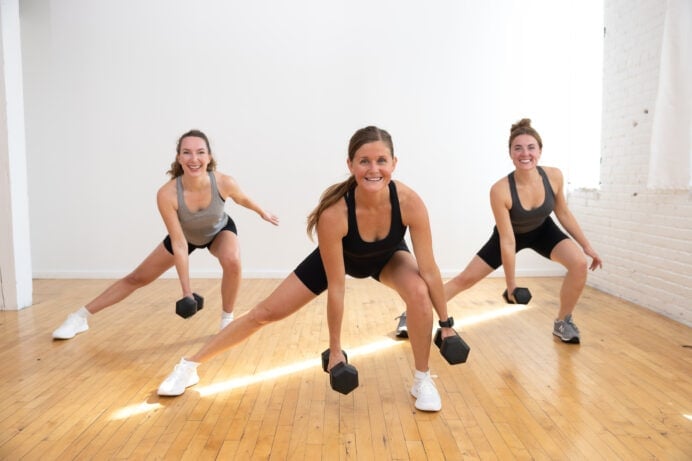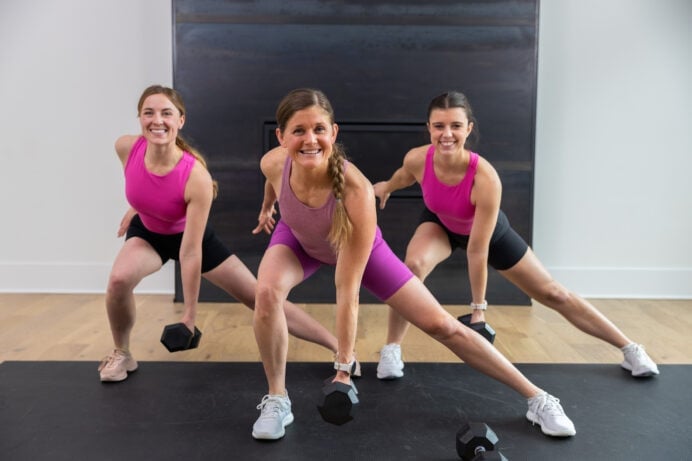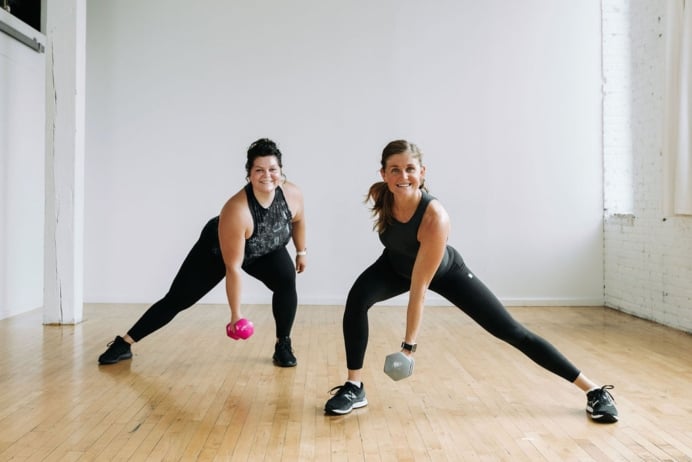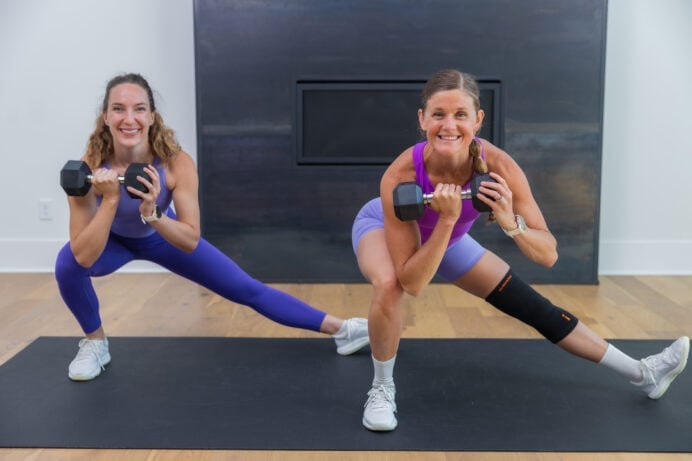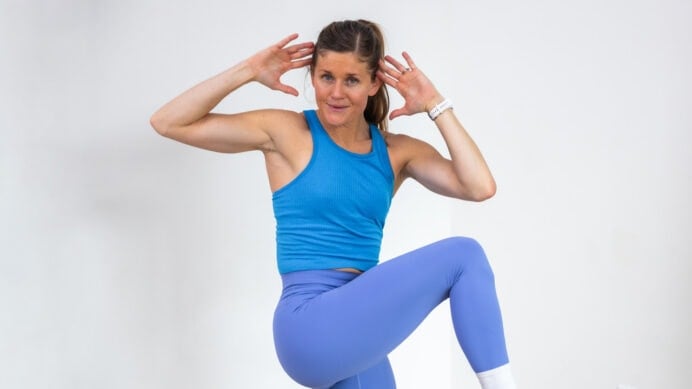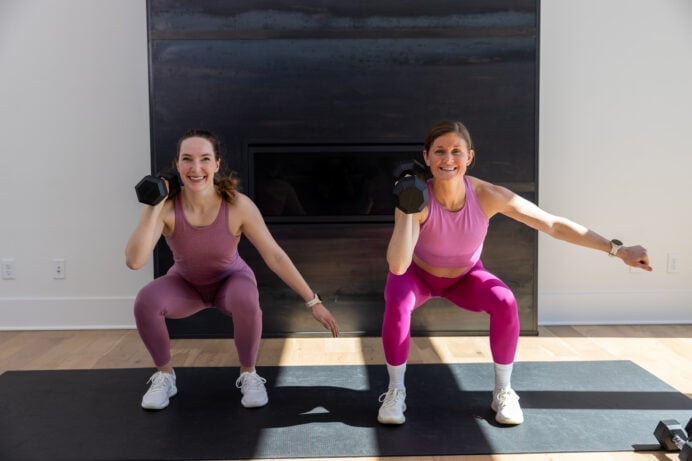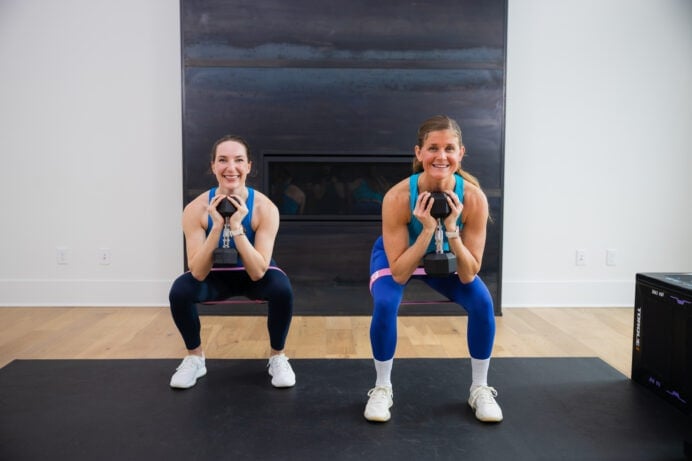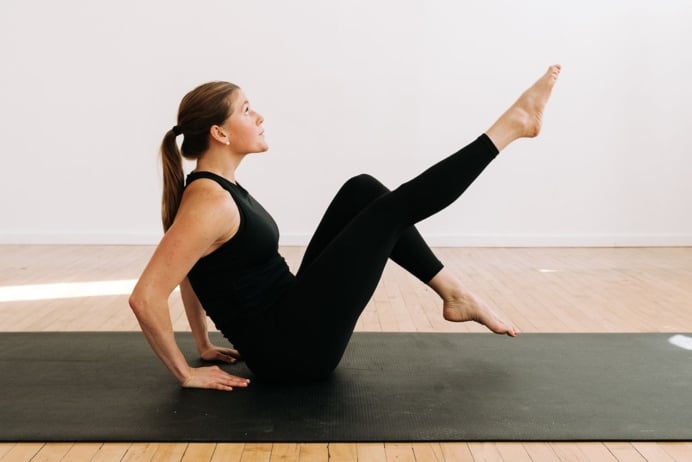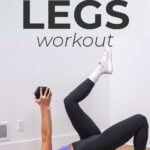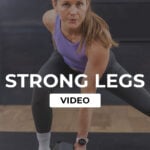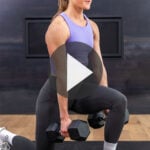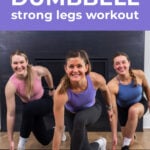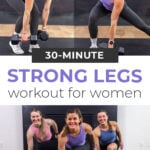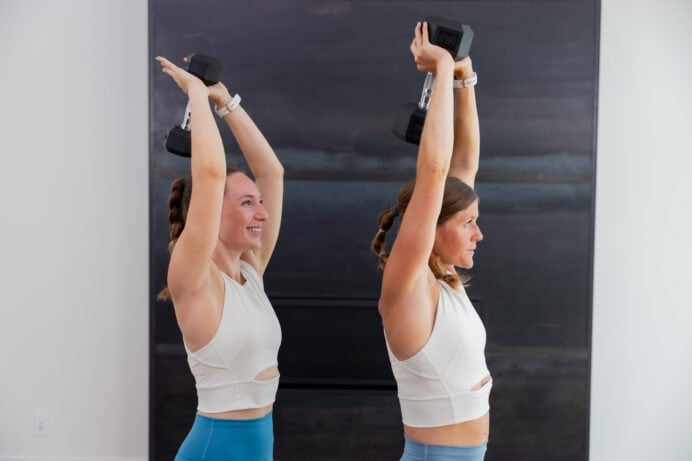
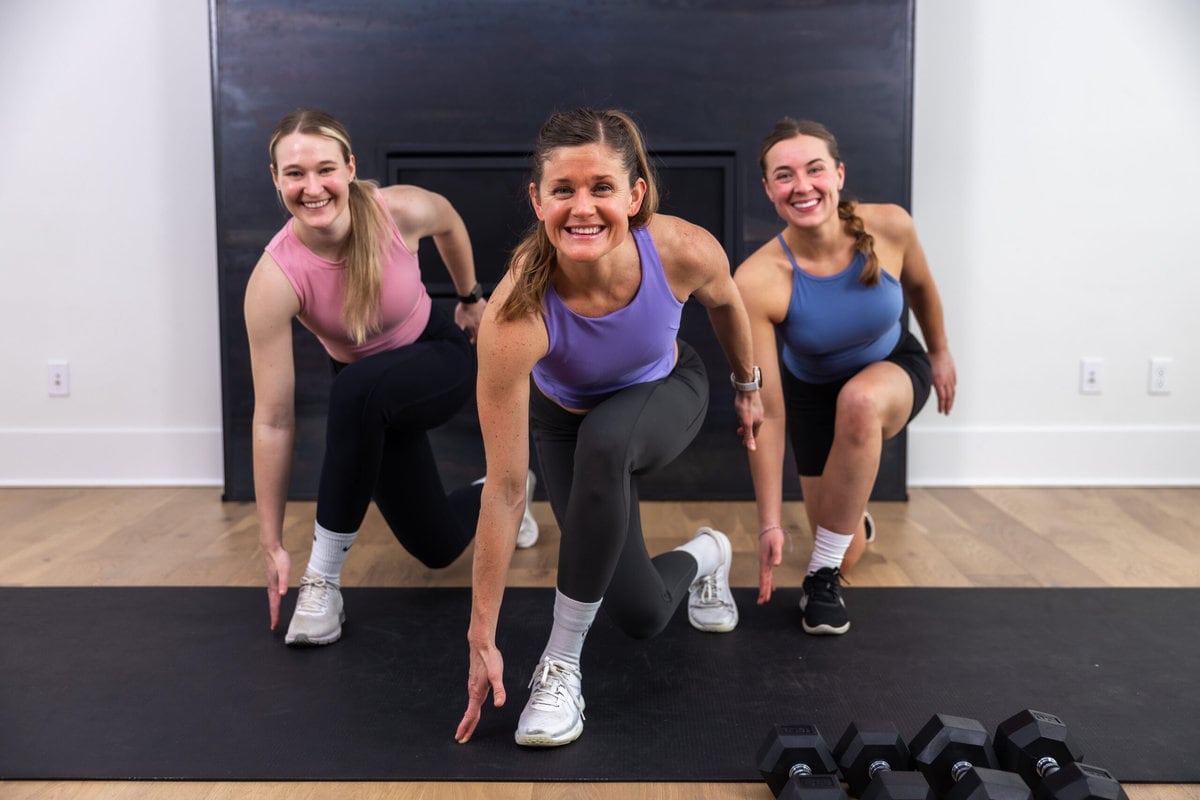
30-Minute Strong Legs Workout At Home
Build strong legs at home with this effective lower body workout. Each circuit pairs an isolation exercise with a compound exercise to increase muscle definition in the legs and glutes. This strong legs workout targets both the large lower body muscles (quads, hamstrings and glutes) as well as the smaller stabilizing leg muscles (hips, thighs, and calves).
This post is brought to you in partnership with the Minnesota Pork Board.
You don’t need tons of equipment or time to build defined, strong legs at home.
Leg day is my favorite workout of the week, because I get to reach for my heaviest weights. The lower body includes some of our largest, most powerful muscles – and I’ve programmed this dumbbell-only workout to push them to fatigue.
I love pairing classic strength training exercises (such as squats and deadlifts) with plyometric exercises (such as squat jacks, or skaters). This combination of strength training and power is extremely effective at building muscle and getting your heart rate up.
You loved the Single Leg Exercises Workout we previously filmed with our veterinary friends from the Minnesota Pork Board.
Today’s strength training workout includes a combination of unilateral (single-sided) and bilateral (both legs) exercises to target the lower body from all angles.
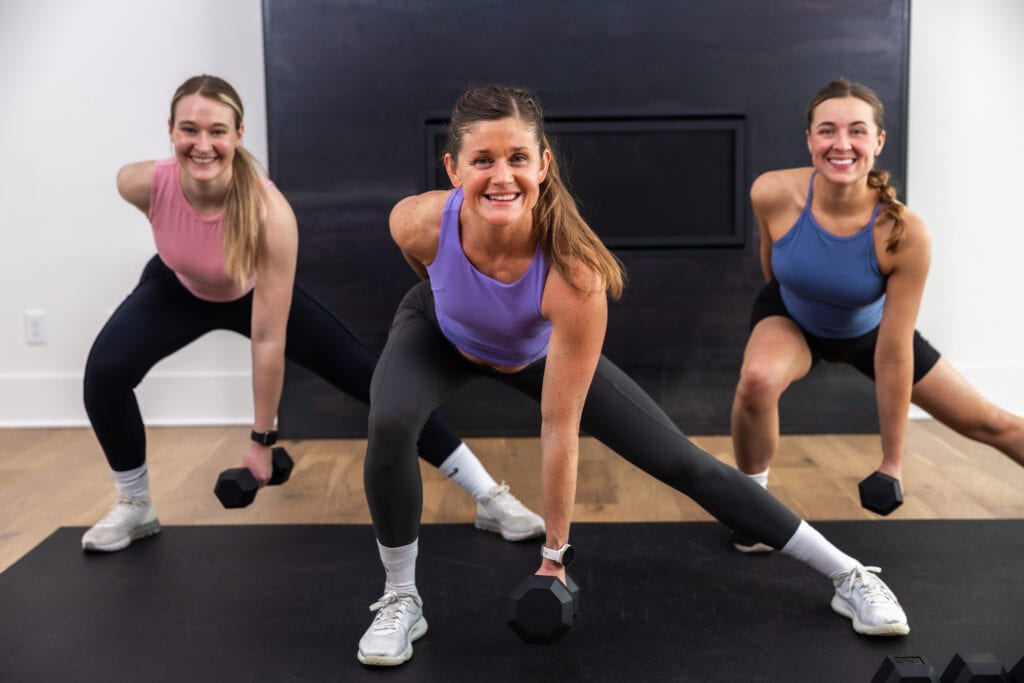
30-Minute Strong Legs Workout
Build strength, burn calories and increase muscle definition with this Strong Legs workout at home.
A complete workout targeting every muscle group in the lower body: the quads, hamstrings, glutes, calves, thighs and core.
Add lower body workouts like this one to your home workout plan one to two times a week to build strength and increase muscle definition.
Workout Instructions:
Follow along with the guided Strong Legs Workout Routine on YouTube, led by certified personal trainer, Lindsey Bomgren.
Your Workout Looks Like This:
- 4 Lower Body Circuits (3 exercises for strong legs per circuit)
- Timed Intervals (30 seconds of work, 15 seconds rest; complete as many repetitions as you can in the timed interval)
- Repeat Each Circuit x2 Sets
- 30 Second Power Burnout Between Circuits
Workout Equipment:
Medium Pair of Dumbbells. I recommend between 5-25 lbs depending on your fitness level. We used 15 and 20 lb dumbbells in today’s workout.
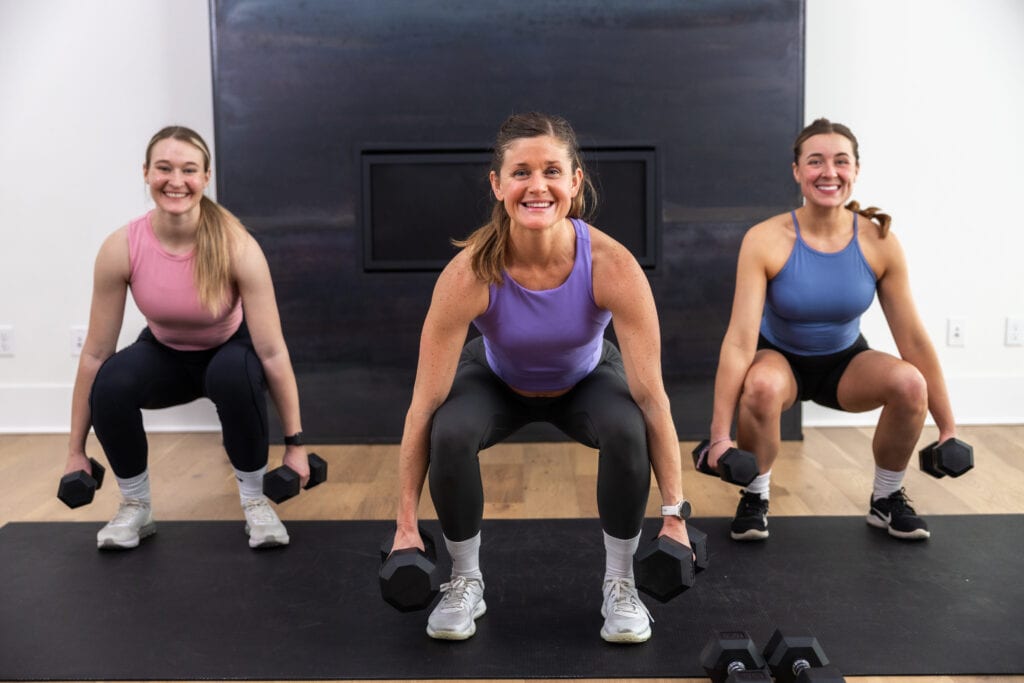
Prefer to Watch On YouTube?
Workout Outline
CIRCUIT ONE:
- Squat
- Lunge
- Two Squats and Two Lunges
Power Move: Lunge Drop and Squat Jack
CIRCUIT TWO:
- Staggered Deadlift
- Curtsy Lunge
- Staggered Deadlift and Curtsy Lunge
Power Move: Full Curtsy Lunge Skaters
CIRCUIT THREE:
- Lateral Lunge
- Calf Raises
- Two Lateral Lunges and Two Calf Raises
Power Move: Three Lateral Pushes and Squat Jump
CIRCUIT FOUR:
- Two Squats, Plank Walkout and Two Cross Body Knee Drive
- Uneven Prisoner Get Ups
- Three Glute Bridge Marches and Three Single Leg Glute Bridge
Power Move: Bound Forward and Bear Crawl Back
5 Exercises For Strong Legs
Squat
Targets: Legs, glutes, quadriceps, hamstrings, hips and core.
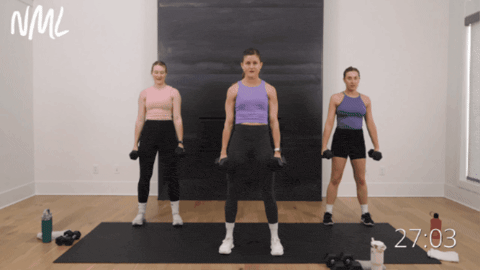
How To Do Dumbbell Squats
- Start standing feet shoulder-width apart, knees slightly bent. Hold a dumbbell in each hand at your sides, palms facing in towards each other (neutral grip).
- Lower down into a squat position, lowering your hips down parallel with your knees. Drive your knees out toward your outer three toes.
- Drive through your heels to stand tall, returning to a standing position.
Reverse Lunge
Targets: Legs, glutes, quads, hamstrings and core. Lunges also target the small stabilizing muscles in your hips and thighs.
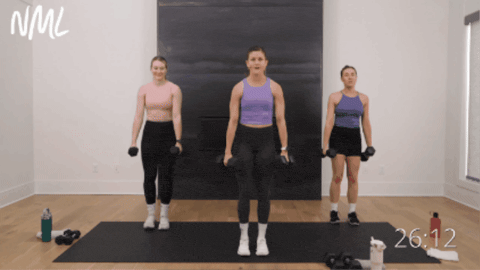
How To Do Lunges
- Start standing in a neutral position, feet hip-width apart, holding a dumbbell in each hand, palms facing in towards each other (hammer curl grip). Option to hold one dumbbell horizontally at your chest.
- Step your left foot back into a reverse lunge. Lowering your left knee towards the mat, both knees bent at 90-degree angles. Think about keeping the torso upright.
- Hold for a moment, then drive through your front, right heel to return to standing.
- Then alternate the movement, this time stepping your right foot back into a reverse lunge.
Staggered Deadlift
Targets: Posterior chain, hamstrings, glutes, core, and lower back.
A more stable version of a single leg deadlift, this exercise shifts most of the work load into one leg while providing more balance support and stability.
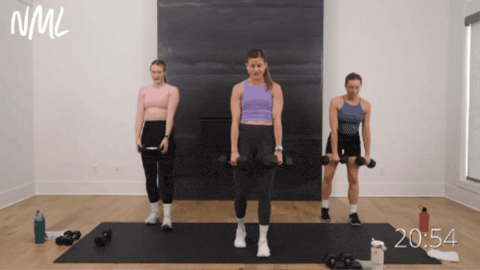
How To Do Staggered Romanian Deadlifts
- Stand with feet hip-width apart, holding a dumbbell in each hand in front of your hips (palms facing in towards your body).
- Stagger your feet, so your right leg is slightly in front of your right foot. Kickstand your back left foot, left heel floating off the ground. Keep 80% of your weight in your front foot, 20% in your back toe.
- Maintain a staggered stance as you hinge at the hips. Pushing your hips back towards the wall behind you as you glide the dumbbells down the front of your legs, keeping your core tight, slightly bending both knees. Range of motion will look different for everyone.
- Drive through your front heel to push your hips forward, pulling the dumbbells back up towards your hip as you stand tall, returning to starting position.
Calf Raise
Targets: Calf muscles (gastrocnemius and soleus) and achilles tendon, improves ankle mobility, and increases balance and stability.
Calf exercises are an important part of any leg day routine. They are commonly undertrained and a key component of lower body strength, stability, injury prevention, and athletic performance.
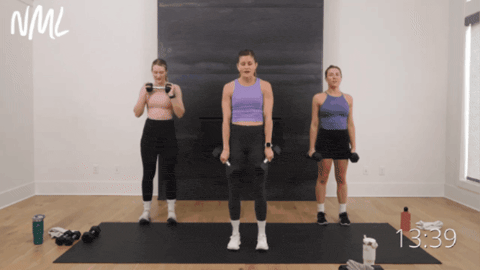
How To Do Weighted Calf Raises
- Start standing on a flat surface, feet shoulder-width apart. Keep your back straight and core engaged to stand tall. Option to hold dumbbells in each hand by your sides.
- Slowly and with control, lift yourself up onto the balls of your feet, heels rising above the ground.
- Lift your heels until you feel a stretch along the back of your legs, balancing on your toes.
- Then, slowly lower your heels back to the ground, returning to starting position.
Glute Bridge March and Single Leg Glute Bridge
Targets: Gluteus maximus, gluteus medius, hips and hamstrings.
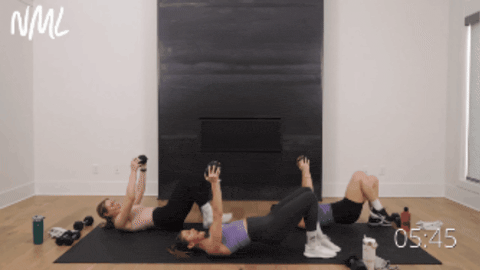
How To Do Glute Bridge Marches and Single Leg Glute Bridges
- Start laying on your back, right foot on the ground, left foot extended straight overhead (ankle stacked over knee). Option to hold one dumbbell horizontally between your hands above your chest, wrists stacked over shoulders.
- Press through your heels to lift your glutes off the mat, squeezing your glutes as you lift. Think about keeping your core engaged and knees in line with your hips.
- Exhale, slowly lowering your hips to hover an inch above the mat. Then, press through your right foot to lift your hips, performing a single leg glute bridge. Repeat three times.
- Then, lower your left heel to the ground, shifting your weight to your left leg as you drive your right knee towards your chest. This is a glute bridge march. Repeat three times.
- Continue this pattern, alternating three single leg hip thrusts with three glute bridge marches.
Strong Legs FAQs
Strong, athletic legs are built through a combination of lower body isolation exercises (such as hamstring exercises, quad exercises, and calf exercises) and compound leg exercises. This combination of multi-muscle exercises and more focused exercises allows us to build muscle in all the major muscle groups of the lower body.
In general, beginners should train legs one to two times a week. As you progress, you can advance to training legs up to three times a week. A well-rounded workout plan will also include upper body workouts and full body workouts.
More Workouts
Leg WorkoutsPin This Workout: Strong Legs Lower Body Workout
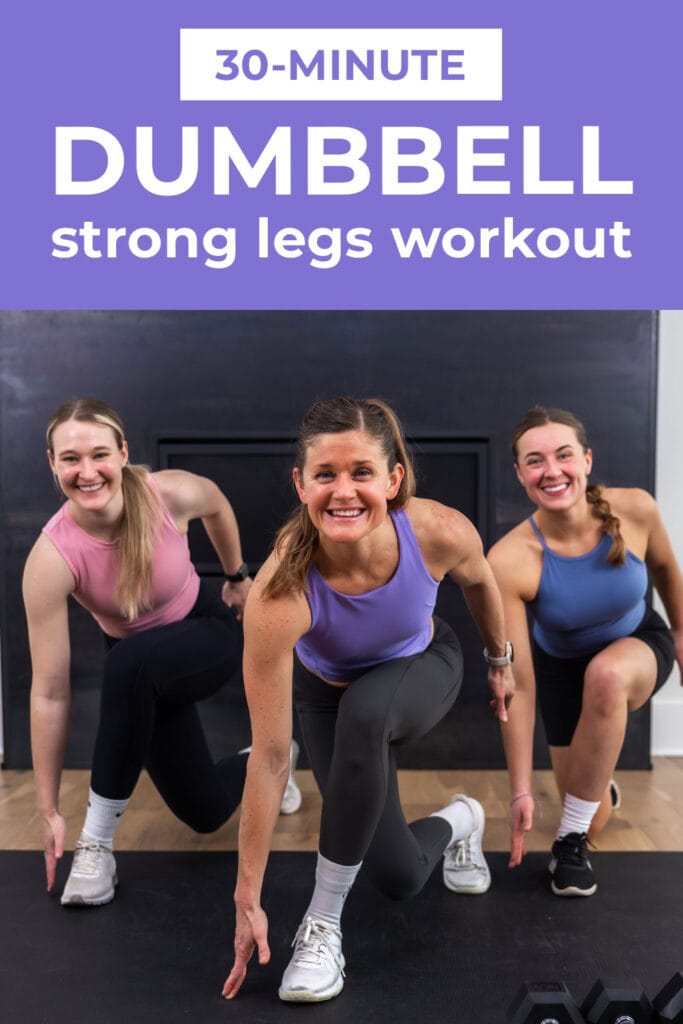
Pork: Lean Protein For Muscle Recovery
I’m going to be totally honest – there’s a reason I’m a fitness trainer, and not a food blogger. I have a few tried-and-true recipes I stick to, but as a busy mom with three little kids, I just don’t love spending my limited free time in the kitchen!
That’s part of the reason I love pork so much – it is so forgiving, and makes a healthy base for many different recipes and flavor profiles. Some of our favorites are pork kebabs, tenderloin roasts and carnitas.
Pork is an excellent source of protein and provides several important vitamins and minerals. A 3-ounce serving of pork is an excellent source of:
- Selenium: supports thyroid health.
- Vitamin B-6: supports mood and brain health.
- Zinc: supports tissue repair and maintenance of a healthy immune system.
- Beta-alanine: form of amino acid found in pork and a crucial element in muscle development.
How To Shop for Pork:
- Both pork tenderloin and pork sirloin roast meet the criteria for the American Heart Association Heart-Check Mark.
- Dr. Taylor’s personal favorite cut is pork tenderloin – it is considered “extra lean” and has the same amount of fat as skinless chicken breast.
- Ground pork is also affordable and really versatile – we love using it for meatballs and lettuce wraps!
For a wide variety of heart-healthy and family-friendly pork recipes, visit mnpork.com.
Minnesota Pork Board
The Minnesota Pork Board (MPB) administers checkoff programs relating to pork promotion, consumer and producer education and research on behalf of more than 3,000 family pig farms in Minnesota.
This is a sponsored post in partnership with the Minnesota Pork Board. All words and opinions are my own. Thank you for supporting Nourish Move Love, making the content you see on this blog possible.
This post includes affiliate links. I do earn a commission for products purchased using these links (at no additional cost to you). Thank you for supporting Nourish Move Love, making the content you see on this blog possible.










